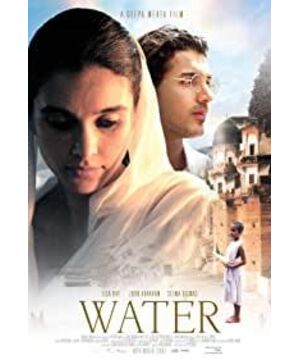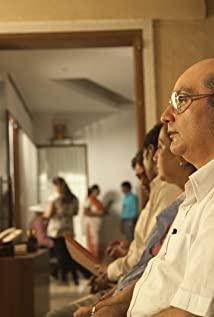I went home that day and watched an Indian movie called "Moon River". The sitar, which represents traditional Indian music, has strong Islamic culture and Persian tunes, the kind of linear music without harmony, the delicate melody is matched with the shimmering Ganges water under the moonlight, this is the legend that can be washed away. The holy river of all the sins and desires of human beings - the Moon River. In the 1930s, the great statesman Gandhi tried to awaken the sleepy land of India with the initiative of peace and democracy. In contrast to the traditional concept of hierarchy of the Indian aristocracy under the cover of religion, in the traditional definition of religion, husbands There are only three paths to fate for a deceased woman: burial; marrying the deceased husband's younger brother with the consent of the family; and being a widow for life. The beautiful Kalianne lives in such a time of contradiction and tit-for-tat. These women who have lost their husbands since childhood and began to live in isolation, the rest of their lives can only be spent in the widow's home. "Moon River" shows us several widowed women of different ages, little Chuya who lost her husband at the age of 7, when her father sent her to this widow's home, she always had expectations, she expected to have One day her mother will come to pick her up, and she is convinced that one day she will start a good life again; there is a kind of stubborn stubbornness about young Carlyanne, she is not completely subject to the rules and regulations of the widow's house, and she has to suffer. The instigation of Maidu, the head of the widow's house, has become a tool for the profit of the widow's house; the middle-aged Shakentara is a little literate, and her education has made her resigned to her own destiny. A devout religious believer; the elderly Namu told everyone about the scene when she and her husband held a wedding ceremony when she was 7 years old. What she could not forget was a food called Ledo that she had eaten at the ceremony. When little Chuya took the stolen When Ledo was placed next to the old man's pillow, Namu burst into tears. She passed away with the sweet smell of Ledo in her mouth in the memories of her wedding ceremony. The story unfolds from the encounter between Narayan and Kalianne, the noble children, by the Moon River. The story itself is not tortuous. In such an era, two people from different classes cannot get together in the end, and the ending is not surprising. Accidentally, Narayan, who lost his lover, left his hometown with pain and became a complete follower of Gandhi. Unexpectedly, Shakentara finally decided to send little Chuya to the train that Gandhi took, and asked Narayan. Young "Give her to Gandhi!". The train slowly went away, carrying the little Chu Ya to look for another life. This is the work of an Indian Canadian female director. Her inspiration came from 10 years ago, when she saw an old widow with a face of vicissitudes by the Ganges River.
The film uses water as a medium for conveying emotions. The Ganges water, which washes away sins, also buries the beautiful and kind Kali Anne. Women, this name has been abused and abused by men for many years, and despite the emergence of groups of feminists, women are still a controversial group. Yesterday, I saw a friend's space and still sighed that women are a resource. In fact, both men and women are resources. It is not only women who use marriage to change their fate. Sometimes it's not that the things themselves are complicated, but the spectators wear colored glasses. When we guess and measure many things with our own morality and experience, the results we get are often distorted. I just think that a person must have a minimum conscience, or be honest and fair. We are all creatures coexisting on the earth. Why can't we cherish each other with a loving heart. Shakentara asked the preacher by the Ganges this sentence: "When conscience and faith go against each other, what should we choose?" I am not a wise man, so I cannot answer such a profound question. It is most reasonable to face and respect every life, and I sympathize with the Indian women of that era.
View more about
Water reviews











